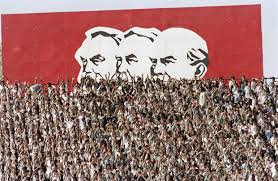To the socialist, the coming of Socialism means a transition from an irrational to a rational economy. Under Socialism, planned management of economic life takes the place of anarchy of production; society, which is conceived as the incarnation of reason, takes the place of the conflicting aims of unreasonable and self-interested individuals. A just distribution replaces an unjust distribution of goods. Want and misery vanish and there is wealth for all. A picture of paradise is unfolded before us, a paradise which—so the laws of historical evolution tell us—we, or at least our heirs, must at length inherit. For all history leads to that promised land, and all that has happened in the past has only prepared the way for our salvation.
This is how our contemporaries see Socialism, and they believe in its excellence. It is false to imagine that the socialist ideology dominates only those parties which call themselves socialist or—what is generally intended to mean the same thing—“social.” All present-day political parties are saturated with the leading socialistic ideas.
Even the stoutest opponents of Socialism fall within its shadow. They, too, are convinced that the socialist economy is more rational than the capitalist, that it guarantees a more just distribution of income, that historical evolution is driving man inexorably in that direction.
When they oppose Socialism they do so with the sense that they are defending selfish private interests and that they are combating a development which from the standpoint of public welfare is desirable and is based upon the only ethically acceptable principle. And in their hearts they are convinced that their resistance is hopeless.
Yet the socialist idea is nothing but a grandiose rationalization of petty resentments. Not one of its theories can withstand scientific criticism and all its deductions are ill-founded. Its conception of the capitalist economy has long been seen to be false; its plan of a future social order proves to be inwardly contradictory, and therefore impracticable.
Not only would Socialism fail to make economic life more rational, it would abolish social cooperation outright. That it would bring justice is merely an arbitrary assertion, arising, as we can show, from resentment and the false interpretation of what takes place under Capitalism. And that historical evolution leaves us no alternative but Socialism turns out to be a prophecy which differs from the chiliastic dreams of primitive Christian sectarians only in its claim to the title “science.”
In fact Socialism is not in the least what it pretends to be. It is not the pioneer of a better and finer world, but the spoiler of what thousands of years of civilization have created. It does not build; it destroys. For destruction is the essence of it. It produces nothing, it only consumes what the social order based on private ownership in the means of production has created. Since a socialist order of society cannot exist, unless it be as a fragment of Socialism within an economic order resting otherwise on private property, each step leading towards Socialism must exhaust itself in the destruction of what already exists.
Such a policy of destructionism means the consumption of capital. There are few who recognize this fact. Capital consumption can be detected statistically and can be conceived intellectually, but it is not obvious to everyone.
To see the weakness of a policy which raises the consumption of the masses at the cost of existing capital wealth, and thus sacrifices the future to the present, and to recognize the nature of this policy, requires deeper insight than that vouchsafed to statesmen and politicians or to the masses who have put them into power. As long as the walls of the factory buildings stand, and the trains continue to run, it is supposed that all is well with the world. The increasing difficulties of maintaining the higher standard of living are ascribed to various causes, but never to the fact that a policy of capital consumption is being followed.
In the problem of the capital consumption of a destructionist society we find one of the key problems of the socialist economic policy. The danger of capital consumption would be particularly great in the socialist community; the demagogue would achieve success most easily by increasing consumption per head at the cost of the formation of additional capital and to the detriment of existing capital.
It is in the nature of capitalist society that new capital is continually being formed. The greater the capital fund becomes, the higher does the marginal productivity of labour rise and the higher, therefore, are wages, absolute and relative. The progressive formation of capital is the only way to increase the quantity of goods which society can consume annually without diminishing production in the future—the only way to increase the workers’ consumption without harm to future generations of workers. Therefore, it has been laid down by Liberalism that progressive capital formation is the only means by which the position of the great masses can be permanently improved.
Socialism and destructionism seek to attain this end in a different way. They propose to use up capital so as to achieve present wealth at the expense of the future. The policy of Liberalism is the procedure of the prudent father who saves and builds for himself and his successors. The policy of destructionism is the policy of the spendthrift who dissipates his inheritance regardless of the future.
Excerpted from Socialism: An Economic and Sociological Analysis. Published as “The Nature of Destructionism,” section 1 of chapter 33, “The Motive Powers of Destructionism.”

